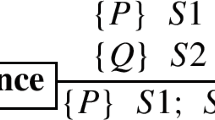Abstract
Concurrent programming is usually considered as a difficult task. This common opinion is investigated, while developing an example of concurrent system. The conclusion is that the difficulty of programming does not lie in concurrency, provided that adequate formal tools are used. These tools must not be more difficult than those used in sequential programming.
Supported in part by the ESPRIT project ATES.
Chapter PDF
Similar content being viewed by others
References
K.M. CHANDY and J. MISRA, “Parallel Program Design: A Foundation”, Addison-Wesley, 1988.
E.W. DIJKSTRA, “A discipline of programming”, Prentice Hall, New Jersey, 1976.
E.W. DIJKSTRA and al., “On-the-Fly Garbage Collection: An Exercise in Cooperation”, CACM, vol. 21, pp. 966–975, 1978.
E.P. GRIBOMONT, “Méthode progressive de synthèse et de vérification de programmes parallèles”, Thèse de doctorat, Université de Liège, 1985.
D. GRIES, “The Science of Programming”, Springer-Verlag, Berlin, 1981.
C.A.R. HOARE, “Communicating Sequential Processes”, CACM, vol. 21, pp. 666–677, 1978.
C.A.R. HOARE, “Communicating Sequential Processes”, Prentice-Hall, 1985.
L. LAMPORT, “An Assertional Correctness Proof of a Distributed Algorithm”, Science of Computer Programming, vol. 2, pp. 175–206, 1983.
G. RICART and A.K. AGRAWALA, “An optimal algorithm for mutual exclusion”, CACM, vol. 24, pp. 9–17, 1981 (corr. vol. 24, p. 578).
J. SIFAKIS, “A unified approach for studying the properties of transition systems”, Theoretical Computer Science, vol. 18, pp. 227–259, 1982.
Author information
Authors and Affiliations
Editor information
Rights and permissions
Copyright information
© 1989 Springer-Verlag Berlin Heidelberg
About this paper
Cite this paper
Gribomont, E.P. (1989). Development of concurrent programs: An example. In: Díaz, J., Orejas, F. (eds) TAPSOFT '89. TAPSOFT 1989. Lecture Notes in Computer Science, vol 352. Springer, Berlin, Heidelberg. https://doi.org/10.1007/3-540-50940-2_37
Download citation
DOI: https://doi.org/10.1007/3-540-50940-2_37
Published:
Publisher Name: Springer, Berlin, Heidelberg
Print ISBN: 978-3-540-50940-0
Online ISBN: 978-3-540-46118-0
eBook Packages: Springer Book Archive




